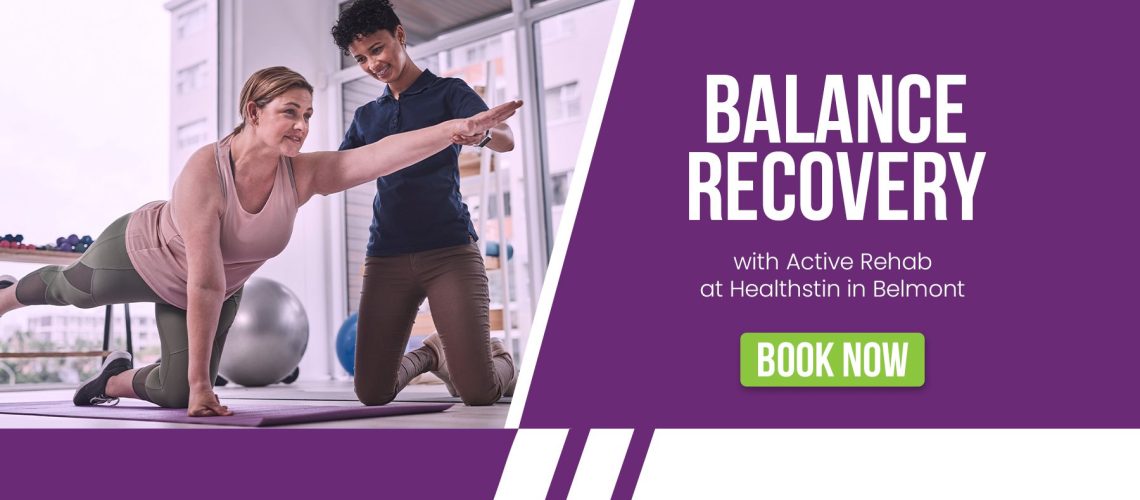In Australia, around 795,000 people are living with the effects of an acquired brain injury (ABI), which includes traumatic brain injuries, strokes, and other neurological conditions. One of the most disabling symptoms reported by survivors is balance impairment, which, according to Brain Injury Australia, affects up to 70% of individuals with moderate to severe brain injury.
Poor balance not only increases the risk of falls, which is a leading cause of further injury and hospitalisation. It also affects mobility, confidence, and the ability to perform everyday activities independently.
As Australia commemorates Brain Injury Awareness Week from August 18 to 24, Healthstin is raising vital awareness about one of the most common and challenging consequences of brain injury: balance difficulties. If you or a loved one is living with impaired balance after a brain injury, you’re not alone. More importantly, active rehabilitation can help you regain stability, confidence, and independence.
Why balance recovery matters
Regaining balance after brain injury is more than just about physical stability; it’s about reclaiming quality of life.
Without targeted support, balance problems can lead to:
- Reduced mobility and social isolation
- Increased fear of falling
- Longer recovery times and dependence on caregivers
That’s why active rehabilitation plays a critical role in brain injury recovery.
What Is Active Rehab for Brain Injury survivors?
Active rehabilitation refers to guided, purposeful exercise and therapy designed to improve physical function, cognition, and independence after brain injury. At Healthstin, our multidisciplinary team of Accredited Exercise Physiologists and Physiotherapists works together to deliver personalised rehab for traumatic brain injury patients.
How Active Rehab can help improve balance after brain trauma
Strengthening and Coordination
- Weakness and impaired coordination are common after brain injury.
- Targeted exercise can help rebuild muscle strength and improve neuromuscular control, essential for maintaining balance during movement.
Vestibular Rehabilitation
- Many brain injury survivors experience vestibular dysfunction, a disruption in the inner ear balance system. This cause dizziness and unsteadiness.
- At Healthstin, our Physiotherapists employ Neuro Rehab for balance recovery, using specialised vestibular rehab exercises to retrain the brain and reduce symptoms.
Gait Training and Functional Mobility
- Improving walking patterns and functional movements like standing, turning, and stair climbing can help restore confidence and independence in daily life.
Hydrotherapy for Balance
- Exercising in warm water reduces the fear of falling whilst providing resistance and support to challenge balance safely.
- Employing aquatic therapy for balance and coordination issues is especially effective in early rehab stages or for those with severe impairments.
Get expert support for Brain Injury Rehab
Located in accessible community health hubs, Healthstin in Belmont offers comprehensive allied health services for brain injury survivors, including:
- Customised Exercise Physiology and Physiotherapy brain injury rehabilitation exercises and programmes
- Hydrotherapy sessions in temperature-controlled pools
- Funding options through the NDIS, Medicare, Department of Veterans’ Affairs (DVA), Workers’ Compensation, the Commonwealth Home Support Programme (CHSP), Home Care Package (HCP), and private health funds
Our team’s expertise ensures your rehab journey focuses on meaningful, achievable goals that can truly enhance quality of life.
Commemorate Brain Injury Awareness Week at Healthstin
If balance issues after a brain injury are holding you back, know that help is available. With Healthstin’s brain injury recovery programme, you can regain stability and confidence to live independently.
Call 1300 090 931, visit our Belmont clinic, or click this link to book a consultation now.

